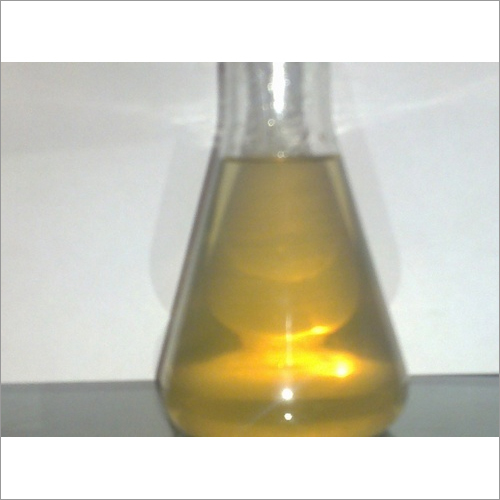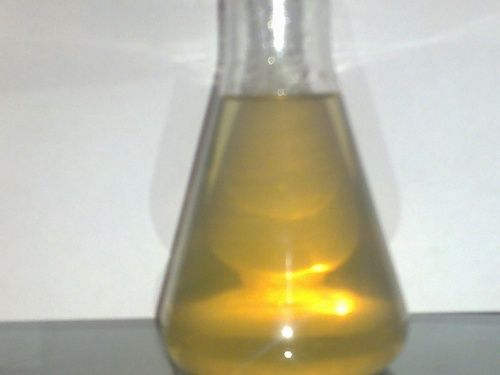Fatty Acid
140 INR/Kilograms
Product Details:
X
Fatty Acid Price And Quantity
- 190 Liter
- 140 INR/Kilograms
Fatty Acid Trade Information
- 1000 Liter Per Month
- 7 Days
Product Description
Fatty Acid is used to make the things that are beneficial for muscles, organs and heart. This is utilized as a building block for cell membranes. It has been included with carbon atoms that are connected with chemical bonds. It is accessible with 0.10 % of moisture and 7% of Fatty acid composition. We offer it in Yellow color and 200 Mg KOH/g of saponification value. Acid value of the acid is 198 Mg KOH/g. This is used to make resin soap.
Fatty Acid Properties:
- Acid Value: 198 Mg KOH/g
- Grade: fatty acid
- Physical State: Liquid
- Physical Form: liquid to semi solid
- Saponification Value: 200 Mg KOH/g
- Moisture: 0.10 %
- Fatty acid composition: 7%
- Colour in Gardner Scale: 5 Max
- Appearance: Pale Yellow Clear Liquid
Frequently Asked Questions:
Q: What are fatty acids?
A: Fatty acids are organic molecules composed of carbon, hydrogen, and oxygen atoms. They are a fundamental component of lipids, which are essential for the structure and function of cells in living organisms.
Q: What are the main types of fatty acids?
A: These acids can be categorized into three main types based on their chemical structure: saturated fatty acids, monounsaturated fatty acids, and polyunsaturated fatty acids.
Q: What are saturated fatty acids?
A: Saturated fatty acids have carbon atoms linked by single bonds, and they are saturated with hydrogen atoms. They are typically solid at room temperature and are commonly found in animal-based fats, such as butter and lard.
Q: What are monounsaturated fatty acids?
A: Monounsaturated fatty acids have one double bond in their carbon chain. They are usually liquid at room temperature and are found in various plant-based oils, such as olive oil and avocado oil.
Q: What are polyunsaturated fatty acids?
A: Polyunsaturated fatty acids have two or more double bonds in their carbon chain. They are also liquid at room temperature and are present in vegetable oils, such as sunflower oil and soybean oil. Omega-3 and omega-6 fatty acids are examples of polyunsaturated fatty acids.
Q: Are all fatty acids bad for health?
A: No, not all fatty acids are bad for health. Some fatty acids, such as omega-3 and omega-6 fatty acids, are considered essential because the body cannot produce them on its own and must obtain them from the diet. These fatty acids play crucial roles in brain function, inflammation regulation, and overall health.
Q: What are trans fatty acids?
A: Trans fatty acids are a type of unsaturated fatty acid that have a specific chemical structure due to hydrogenation, a process that converts liquid oils into solid fats. Trans fats are typically found in processed and fried foods and have been linked to an increased risk of heart disease.
Q: Can consuming fatty acids be beneficial for health?
A: Yes, consuming the right types and amounts of fatty acids is essential for maintaining good health. They provide energy, aid in the absorption of fat-soluble vitamins, support cell growth, and help regulate many bodily functions. Including sources of healthy fats, such as fatty fish, nuts, seeds, and plant-based oils, in the diet can have positive effects on overall health.
Q: What are some food sources of healthy fatty acids?
A: Good sources of healthy fatty acids include fatty fish (such as salmon and sardines), avocados, nuts (such as almonds and walnuts), seeds (such as chia seeds and flaxseeds), olive oil, and coconut oil.
Q: Are there any health risks associated with consuming excessive amounts of fatty acids?
A: Consuming excessive amounts of certain types of fatty acids, particularly saturated fats and trans fats, can increase the risk of various health problems, including heart disease, obesity, and high cholesterol levels. It is important to consume these fats in moderation and focus on obtaining a balance of different types of fatty acids in the diet.
Tell us about your requirement

Price:
Quantity
Select Unit
- 50
- 100
- 200
- 250
- 500
- 1000+
Additional detail
Mobile number
Email
Other Products in 'Fatty Acid' category
We exports in Russia, Europe, Gulf countries and African countries.
 |
SHIV SHAKTI INDIA
All Rights Reserved.(Terms of Use) Developed and Managed by Infocom Network Private Limited. |


 English
English Spanish
Spanish French
French German
German Italian
Italian Chinese (Simplified)
Chinese (Simplified) Japanese
Japanese Korean
Korean Arabic
Arabic Portuguese
Portuguese



